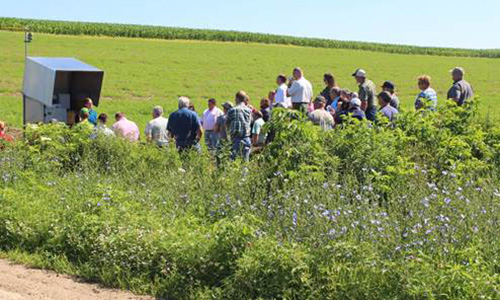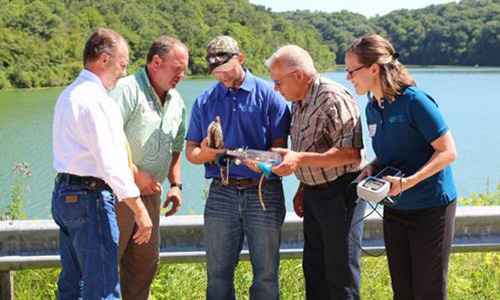
"We will never tell you how to farm," Amber Radatz, co-director of UW Discovery Farms, explained to a group of more than 65 farmers, policymakers, and agency personnel during a recent tour of the Jersey Valley Watershed in Monroe and Vernon counties. "We can, however, tell you what impacts you will see with the use of certain practices on a specific landscape."
The tour covered many of the watershed's 5,000 acres where the UW Discovery Farms® Program, part of UW-Extension, monitors the edge of farm fields, the West Fork Kickapoo River, and the Jersey Valley Lake. The goal of the Jersey Valley Watershed Project, now in its fifth year, is to gain a better understanding of water quality in the area and how farm practices influence water quality downstream.
"Our data clearly shows that no-till and reduced till systems minimize soil loss," explained Eric Cooley, UW Discovery Farms co-director. "Highly erodible landscapes, like the Jersey Valley Watershed, tolerate less soil disturbance than flat landscapes." Farmers in this watershed understand that controlling soil loss is a combination of limiting soil disturbance and protecting concentrated flow areas with waterways and other landscape appropriate practices.
Although no-till farmers have made the coarse adjustment to control nutrient loss by controlling soil loss, UW Discovery Farms data shows there is still room for improvement. "For farmers who don't incorporate nutrients we're seeing some dissolved phosphorus loss in March," explained Radatz. "In the wintertime, phosphorus loss is mostly related to how much phosphorus is at the soil surface and/or manure applications shortly before runoff." There is a delicate balance to strike between incorporation and soil disturbance.
When participating farmers were asked if they changed any practices as a result of Discovery Farms, one farmer explained that Discovery Farms, "encourages us to do more, and to make things better." Other farmers mentioned adjusting their N credits and N timing, tweaking their crop rotation, adopting nutrient management plans, and changing outlot feeding locations because of conversations with Discovery Farms about their data from working farms.
Wisconsin Secretary of Agriculture Ben Brancel commended Discovery Farms efforts to try to make sense of what goes on in the environment. He emphasized the importance of on-farm research for both policymakers and farmers. It arms policymakers with accurate information so they do not have to make decisions in the dark. "It also helps the farming community know their footing, know their landscape, and know where they're heading," said Secretary Brancel.
The Jersey Valley Watershed Project is one of many projects of the UW Discovery Farms Program: a program which has worked with Wisconsin farmers on water quality for over 12 years. Monitoring in the watershed will continue until 2017. For more information on the project visit www.uwdiscoveryfarms.org or contact Amber Radatz at aradatz@wisc.edu.


8.28.2015